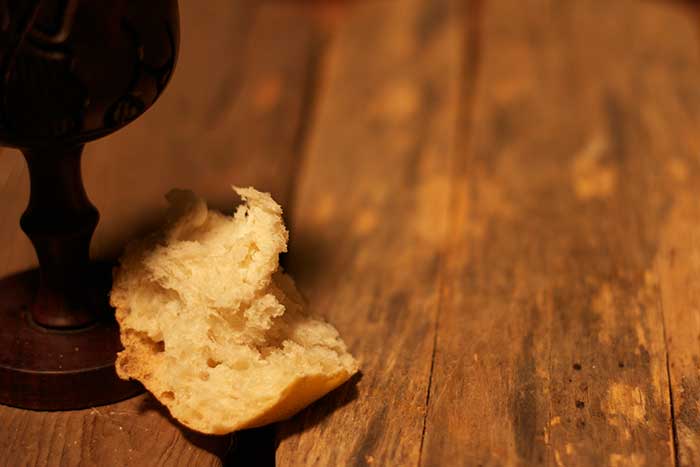One of the significant disagreements within the Christian Church over the last five hundred years has been over the sacraments. The Catechism in the English (1662) Book of Common Prayer defines a sacrament as
an outward and visible sign of an inward and spiritual grace given unto us, ordained by Christ Himself, as a means whereby we receive the same, and a pledge to assure us thereof.
It is a sign, a means, and a pledge.
It is a sign in that it represents or points to something beyond itself. While it is not the thing itself there is a similarity or a similitude between the sign and the thing signified. In the Lord’s Supper the similitude is in the nourishing, in that as bread nourishes our physical body, so Christ’s body broken feeds our soul.
Also, as the bread we eat in the Lord’s Supper is a sharing in one loaf of bread (we usually forget this today), so we who eat are one body in Christ – as Paul says in 1 Corinthians 10:17.
Furthermore, as we eat the bread and drink the wine, Christ through his Spirit, draws his people into his presence and into fellowship with him in heaven. It is something we can’t verbalize, but we partake of all the benefits he has won for us when his body was broken and his blood was shed at Calvary.
SACRAMENTS
The sacraments are linked to God’s Word. Without this they would be dumb signs. The sacraments visibly present the promises of the gospel of the Lord Jesus Christ which we have heard. The sacraments make visible what is preached. Christ himself authorized this when he added his teaching and his promises, his word, to the physical elements of the bread and the wine in the Lord’s Supper, thus transforming the bread and the wine into a sacrament.
The sacrament is a means of grace. When, and only when, we believe the promise of the gospel do we spiritually benefit as we partake of the Lord’s Supper. In this instance, believing is seeing since we see the word of God’s promise as a visible word in the sacrament. The Lord’s Supper is an outward and visible guarantee or pledge of our faith in Christ. To paraphrase Archbishop Thomas Cranmer’s words: ‘As the bread, which is only a signification and figure, is eaten, our souls are fed and nourished with the spiritual benefits of Christ’s flesh and blood to eternal life.
The sacrifice for sin is complete. None of this means the physical substance of the bread and wine changes (transubstantiation), nor does it mean that Christ is physically present in the elements. As God-man, he is in heaven. This is the reason we exhort each other to ‘Lift up our hearts’ – we are to lift them up to where Christ Jesus is, in heaven. Furthermore, the Letter to the Hebrews is clear that the priestly and sacrificial work of Christ has been completed once and for all time (Hebrews 10:11-14). There is no need, indeed it subverts the meaning of Jesus’ death at Calvary, to repeat, re-present, or re-offer the sacrifice of Christ in the Communion.
In his second prayer book (1552), which stands behind the English 1662 BCP, Thomas Cranmer was keen to remove all ambiguity and set out clearly God’s gospel. So he took out words calling out for the Spirit to come upon the elements (the epiclesis). Appropriately, a prayer for the Spirit to come upon God’s people is at the beginning of the service. He also removed words that gave any impression of our offering anything for our salvation.
When we come to the Lord’s Supper we remember with grateful hearts what Jesus did on our behalf when he was crucified. We benefit now when, by faith, we are nourished spiritually by Christ, being drawn into his presence and into a conscious and joyful fellowship with his people. Furthermore, as we eat the bread and drink of the cup we look ahead to the day when we shall eat and drink with Christ and his people when he comes in the glory of his kingdom.
No wonder Paul the Apostle commands us to prepare before coming to the Lord’s Table: Let everyone examine themselves, then, and so eat of the bread and drink of the cup (1 Corinthians 11:28).


